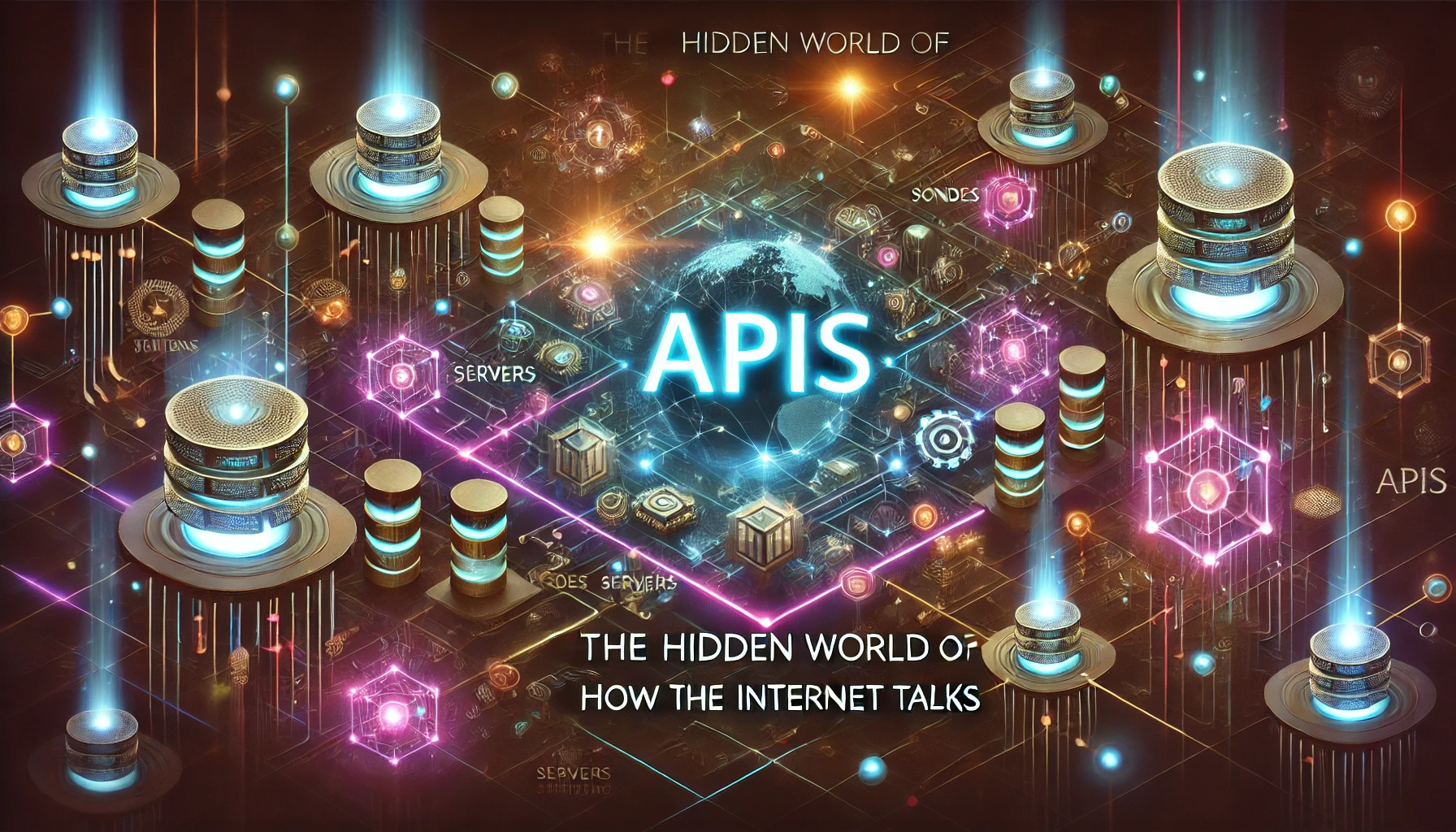The internet is a vast, interconnected world. It's a place where cat videos, TikTok dances, and memes coexist alongside groundbreaking medical research, online banking, and your embarrassing Google search history. But behind the flashy websites and endless streams of content, there's a quiet, invisible world making everything work. This mysterious world is powered by APIs — and if you're not familiar with what that means, don't worry. You're not alone. APIs might sound like techy wizardry, but they’re actually pretty simple once you break them down. So, buckle up, because we're about to take a deep dive into the hidden realm of APIs, the unsung heroes of the internet.
What's an API Anyway?
If you're reading this and thinking, “API? That sounds like some sort of space-age technology,” you’re not too far off. But API stands for Application Programming Interface, which is a fancy term for a set of rules that allow one software application to talk to another. Picture it like a waiter at a restaurant. You (the user) give the waiter your order (a request), and they go to the kitchen (the server), where your food (data) is prepared and then brought back to you. You don’t need to know how the kitchen works; you just want your food delivered in a timely manner. Similarly, APIs are the waiters between different systems, passing data back and forth without you needing to know how everything is actually happening under the hood.
So, the next time you use an app to check the weather, or send a message, or scroll through your favorite social media feed, there’s probably an API behind the scenes fetching data and ensuring your experience goes smoothly. It's a quiet little helper that gets no applause, but does all the heavy lifting.
APIs Are the Internet's "Connector Tissue"
If the internet were a human body, APIs would be the connective tissue that holds everything together. Imagine trying to get your Spotify playlist recommendations without Spotify connecting to your profile, or logging into an app using your Facebook account — APIs are the reason these seemingly magical feats are possible.
For example, when you use a weather app, it doesn’t have all the data for every city stored directly on your phone. Instead, it asks a weather service via an API to send back the current conditions for your location. The weather service doesn't care what device or app is asking for the data, as long as the right “magic words” (called requests) are used. The weather service then sends back the information, and your app displays the results. It’s like a digital game of telephone, but instead of whispering secrets, it’s sending precise data from one system to another.
API Requests: A Language of Their Own
One of the coolest things about APIs is that they can communicate in their own language. Just like how you speak English to your friends and colleagues to understand each other, APIs use a set of standardized protocols like HTTP, JSON, or XML to talk. You don’t have to be a coder to understand this, but if you’ve ever seen the word “GET” in a URL, or noticed “POST” when filling out a web form, congratulations! You’ve witnessed API communication in action.
- GET: When you visit a website, your browser sends a "GET" request to the server, asking for the page. The server responds with the data, and boom — the page loads.
- POST: When you fill out a contact form or submit an order, your browser sends a "POST" request to the server, carrying your information along for the ride.
And it's not just humans who use these APIs. Machines, servers, and even whole systems rely on APIs to share data, whether it’s to update your social media feed or process a credit card payment. Without APIs, the internet would be a lot like a badly written play where the actors keep missing their cues and nobody has a script.
Why Do APIs Matter to Us?
Now, you might be wondering, "So what? What does this mean for me, the average internet user?" Good question! APIs are everywhere, but they’re usually so seamless that we don’t even notice them. But imagine a world without APIs for a second. You would have to manually log into every website to check your messages, track your package, or even see your bank balance. No API means no single sign-on, no automated updates, and no smooth experiences when jumping from one app to another.
Think about how you use Google to search for stuff. You type something in, and almost immediately, a list of relevant results appears. How does Google do that? You’re actually making an API request to Google’s server, which retrieves search results from its massive database and sends them back to you. No API, no search. And trust me, without search, the internet would be a very frustrating place. We’d all be flipping through the Yellow Pages of the internet, hoping to find that one elusive website.
The API Economy: More Than Just Cool Technology
APIs aren’t just a convenience — they’ve also created a new economy. Companies and services can now easily connect with each other, build on top of each other, and share data in ways that were never possible before. For example, your favorite food delivery app might use Google Maps’ API to show you restaurants nearby. Or, if you’re booking a flight, an airline might be using a third-party API to get live flight information from another provider. By using other people’s APIs, businesses don’t have to reinvent the wheel. They can plug into existing systems, reducing costs and saving time.
Even more mind-blowing: APIs are the backbone of the gig economy. Apps like Uber, Lyft, and Airbnb all rely heavily on APIs to provide seamless, real-time experiences. When you book a ride, APIs are handling everything from the driver’s location to your payment processing, making sure your ride arrives in minutes, not hours. Behind all that magic is an army of APIs working together to make everything run like clockwork.
The Dark Side of APIs: Security and the Web of Trust
As much as APIs are helpful, they can also pose risks. Remember how I mentioned that APIs are like waiters running back and forth between the kitchen and your table? Well, imagine if one of those waiters decided to take a wrong turn and delivered your burger to the wrong table. Now, imagine if that “wrong table” is a malicious hacker who wants to steal your data or hijack your account.
APIs, by design, have to expose some level of access to data. That makes them an easy target for cyber attacks. A poorly secured API could allow bad actors to bypass authentication, get access to sensitive data, or even manipulate the system. This is why API security is a huge focus for developers and businesses. Most modern APIs use OAuth (a fancy term for letting people safely log in without giving up your password) and API keys (unique codes that help verify users) to keep things secure.
Wrapping Up: APIs are the Unsung Heroes of the Web
At the end of the day, APIs are the glue holding the internet together. They make it possible for apps, websites, and services to share data in an efficient and secure way. Without them, we’d be back in the old days of the internet — slow, disjointed, and clunky.
Next time you open an app or visit a website, take a moment to appreciate the APIs doing their quiet work behind the scenes. They may not get the credit they deserve, but without them, your digital life would look very different. And let’s be honest, nobody wants to go back to those pre-API days when we had to remember all of our passwords or wait five minutes for a page to load. So, let’s raise a glass to APIs — the unsung heroes of the internet.
Just don’t try to hug one. They’re not that kind of API.
Share this article
You might also like
Hello, World!
The Journey of Computing and the Birth of "Hello, World!" Computers are everywhere, yet their roots lie in fascinatingly humble beginnings.
Read MoreThe Unsung Heroes of Tech: Open Source Communities
Open Source: A Quick Refresher First things first, what exactly is open source? Simply put, it’s software with source code that’s open for anyone to
Read MoreWhy Your Code Should Be Beautiful: The Art of Clean Code
When was the last time you looked at a piece of code and thought, Wow, that’s beautiful!? Chances are, not recently. Many developers prioritize
Read MoreThe Eternal Struggle: Dark Mode vs. Light Mode
Once upon a time, back in the ancient days of computing, screens were mostly black with green or amber text. This wasn’t a “dark mode”—it was the
Read MoreWhen Machines Dream: The Art and Science of AI-Generated Creativity
In recent years, artificial intelligence has made a dramatic leap from number crunching and algorithmic problem-solving to creating something many of
Read MoreThe Death of Moore’s Law: What Comes Next?
For over five decades, Moore’s Law has been the north star guiding the semiconductor industry. This simple yet profound observation, made by Intel
Read MoreWill AI Replace Developers? The Future of Coding
Ah, the question that haunts late-night programming forums and inspires spirited debates over coffee: Will AI replace developers? Before you start
Read More






.jpg)



